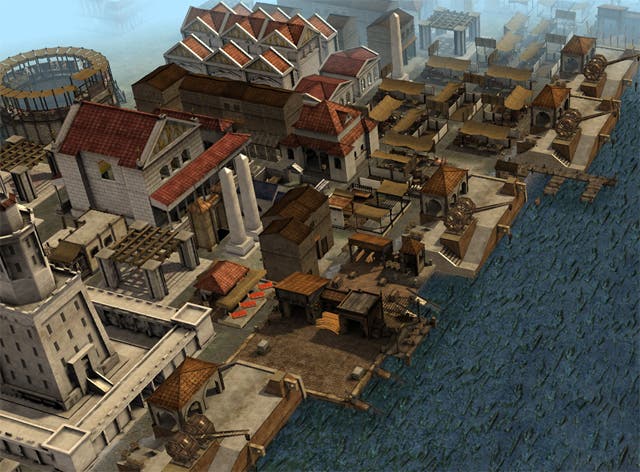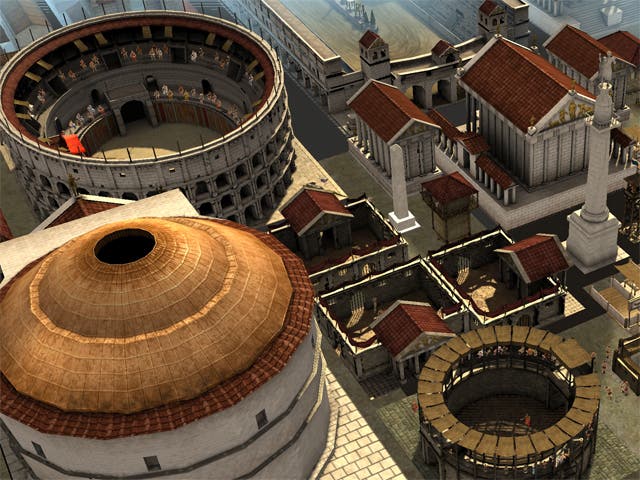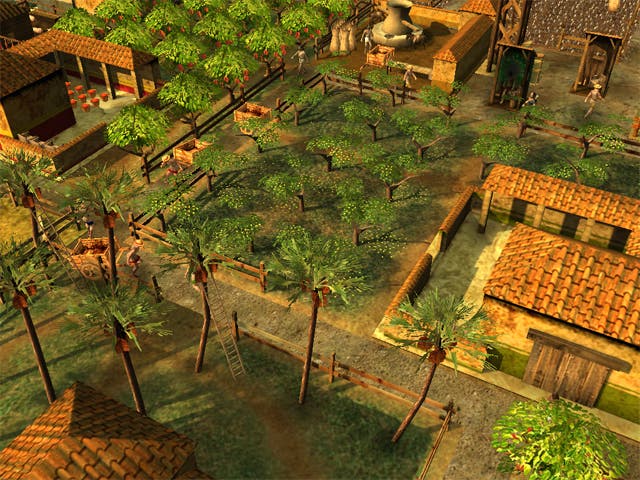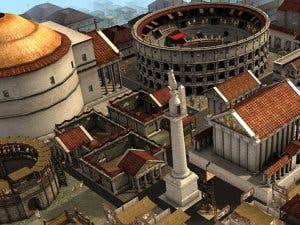CivCity: Rome
Making history in more ways than one.
It's a familiar story. Someone makes a brilliant game, a game that's truly inventive and incredibly playable, and it goes on to sell millions of copies. But even before the first of many inevitable sequels turns up, other developers have gone and nicked all the best ideas for their own games.
Hence the vast array of third person action adventures set in gritty urban environments that now line the shelves, to give just one example. Now, you can't really blame developers for trying to cash in on others' success and give gamers more of what they appear to want (although you can blame them for trying to make a quick buck by churning out appalling clones and hoping no one notices, obviously).
But here's an arguably better plan: what if, rather than just taking elements from another game, developers worked directly with the people who made the original? After all, they're the ones who know more about what makes the game work than anyone else, which means the new game will turn out much better, surely?
Well, that seems to be the thinking behind CivCity: Rome, which is being jointly produced by Civilization dev Firaxis and UK studio Firefly. As Firaxis's Barry Caudill explains, the project came about because Firefly was pitching the idea of a game set in ancient Rome to Take-Two - which, as luck would have it, had just acquired Firaxis, and the Civilization licence.
It was Take-Two bigwig Christoph Hartmann who came up with the idea of bringing the two studios together to work on a single game, and a series of meetings followed to discuss the best way to go about it.
"That was the initial thing - we worked on how we could tie this game into the Civilization world, and there's all these different levels where it works; everything from naming conventions to things like research and all the various things that are always part of a Civ game," Caudill says.
"There was also this idea that we usually abstract a lot of stuff in the cities of Civilization, because if we didn't the game would take forever - you'd be spending all this time tweaking every city and then 200 hours later you might finish the game."
So, they decided the new game would take elements from Civilization, but shift the focus - so instead of building multiple cities to create a giant empire, you concentrate on one at a time. You're responsible for building every single house, and for managing every single resource - according to Firefly's Simon Bradbury, who's the lead designer on the game, it's like taking a city from Civilization and "putting it under a magnifying glass."
Starting out

To demonstrate this, Bradbury takes us through the basics of establishing your own city. The first thing you do is decide where your town centre will be, which involves a bit of strategic thinking - near a forest, perhaps, so the inhabitants can make cash from timber? Or near the sea, so you can quickly establish trade routes with settlements across the water?
Once that's done, it's time to create jobs so people are attracted to your city. You might want to plant olive groves to create farming jobs, for example, and then you'll need an olive press to make oil and a warehouse to store your produce. You'll also need to build houses to home employees, and you might like to stick in a few roads - this isn't obligatory, but it'll speed up the rate at which your citizens travel around, and consequently their rate of production.
You start out with a decent amount of dinari with which to pay for all this, but it won't last for long, so alternative sources of income are needed, and one of the most profitable of these is the taxes your citizens pay on their houses.
As Bradbury puts it, "Housing is to CivCity what cities are to Civilization." The bigger and better your citizens' houses are, the more tax they'll pay you - but before they're willing to upgrade their homes, they'll want access to certain resources.
You start off by installing a well, for example, which encourages the locals to turn their "small shacks" into "medium shacks". Stick in a goat farm and a butcher's shop and it's "large shacks" all round... And so it continues. You can find out what your citizens want next at any time by clicking on their homes, which will also tell you how far they're willing to travel - if it's too much of an effort to go and collect water, they won't bother, and the small shacks will stay small. It's not the end of the world if you make a bad planning decision early on, though, since you can always relocate houses and their inhabitants later.
Once you've provided the basics, citizens will start asking for stuff like temples, and eventually, once they're all living in mansions and palaces, you might like to build a giant colosseum to keep them entertained. Which means you'll also need a gladiator training school, animal trainers and animal pens - then you can send lions, giraffes, crocodiles, elephants and ostriches off to battle it out for the amusement of your citizens.
Extremely disappointingly, you can't decide which animals fight each other, so there's still no answer to the age-old question of who would win out of a giraffe and an ostrich. But the point is, you can watch the fights - and indeed everything else that goes on in your city - from a close-up vantage point, something which is being highlighted as one of the game's key features.
Watch and learn

According to the press blurb, CivCity: Rome is the first ever city builder that actually lets you look inside the buildings you've constructed, from individual homes and shops to the Roman baths (they just call them 'baths', of course). You can also learn about what it was like to live back then by watching people go about their daily tasks, and find out how they wove cloth, made olive oil, baked bread and so on. You can also view the name of each family living in your city, and read about when they arrived, when they got married, even when their children were born. And if you're still hungry for history, there's also a feature called the Civilopedia, which serves as a handy guide to all aspects of Roman life.
To get a general overview of how your city is progressing, you'll need to view the population report screen - which uses a smiley face system that will be familiar to Civilization fans. You can see how satisfied they are with things like housing, employment levels, food rations and their salaries on this screen - a green symbol means they're happy, yellow means content, and red means this is rubbish and the house prices are obscene - we're thinking of moving to Brighton actually.
Of course, you can control things like wages and housing, but there are also external factors which you can do nothing about. If, for example, your citizens hear that Attila the Hun has attacked a nearby settlement, they'll be unhappy until the threat has subsided.
There's also a report screen which displays your civilisation rating - this refers to how well your city is doing in terms of civic services, entertainment, religion and splendour (having a lot of piazzas, fountains, statues and the like helps with that last one). The higher your civilisation rating, the more pleased the bigwigs up in Rome are with you.
As your city grows, you'll want to start researching new technologies - there are around 70 to choose from, and there's a vertical research tree instead of the horizontal one in Civilization. You might like to find out how to build smoother roads, for example, which will speed up the rate at which your citizens travel around by 25 per cent, or how to make wine. Researching stuff not only improves your city generally, but also builds up your reputation within the wider empire.
On a mission

So that's how the game works, essentially - and if you so choose, you can spend all your time just building cities, making them as great and glorious as possible. However, there are also a selection of missions to choose from. They're all tagged up as being either easy, medium or hard, and there are three mission types - some simply involve building a massive city, while others have defined objectives, such as producing a set amount of olive oil for shipment to Rome, and others involve a bit of combat.
But don't expect huge epic battles like you'd generally find in a Civilization game - the combat in CivCity is "deliberately very light and simple," as Caudill explains.
"Combat is not so direct now, it's more simplified, because if combat was just as important as it is in a Civ game, and you were also trying to build a city, you'd have too much to do.
"In a game like CivCity, it's all about watching the people move around and go about their daily lives and things like that. If it was also about combat, something would have to give - you'd probably do one thing really well or the other thing really well."
There's no multiplayer option, either; Bradbury says the decision not to include one was taken very early on in the development process. "We just thought it's not appropriate for us. Civ has an element of confrontation in it between colliding empires, but we thought, no, we'd just be putting it in to add a feature onto the feature list."
As far as Firefly is concerned, CivCity is really "just a continuation of Civilization, at the end of the day - Civilization stops at a city level, and we are just taking that a stage further. So I guess we're a little bit less combat-oriented than Civ."
History repeating

Both Bradbury and Caudill say the experience of working together has been an extremely positive one - and that they're keen for the relationship to continue in the future. Which means you can expect more instalments in the CivCity series, providing this one does well - but which civilisation will they turn their attention to next?
"We do have one we talk about a lot, but I can't say anything about that," Bradbury says. Caudill chimes in: "The official Firaxis answer to that is we have lots of exciting ideas, but we're not prepared to talk about them yet. That pretty much covers everything!"
So, Firefly and Firaxis are happy with the fruits of their labour, but how are Civ fans going to react? Is there a concern that they'll view CivCity negatively since it's not a "pure" Civilization game?
"I don't know if that's a concern. I do know that not every single Civ fan is going to get CivCity Rome and say, 'That's my game, I have to play that,'" Caudill says.
"But I feel like this is a great opportunity to expand the audience. It's not going to detract from Civilization - I think if we were to put out Civ V, and make just as many improvements as before, I don't expect there to be any dilution of our fan base because of CivCity. I think it's really positive for both games."
You'll be able to find out just how positive when CivCity: Rome arrives this summer. In the meantime, why not try experiencing Roman life first hand by having a bath, dressing up in a sheet and then gorging yourself on food and wine for ten hours? Top tip: Wetherspoon's toilets in small northern towns at 10.45pm on a Friday night make ideal "vomitariums".

